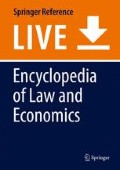Abstract
Recent works in Law and Economics distinguish between the so-called de jure and de facto institutions. We define these two types of institutions, as well as indicate their place in the broad institutional system, in particular relative to the formal/informal and external/internal distinctions applied in (new) institutional economics. We also mention the possible interrelationships between de facto and de jure institutions, linking them to economic outcomes, and provide examples of de jure/de facto analyses in Law and Economics. Finally, we reflect on controversies and lacunas in the literature and present an outlook for future research.
References
van Aaken A, Feld L, Voigt S (2010) Do independent prosecutors deter political corruption? An empirical evaluation across seventy-eight countries. Am Law Econ Rev 12(1):204–244
Acemoglu D, Robinson JA (2006a) Economic origins of dictatorship and democracy. Cambridge: Cambridge University Press
Acemoglu D, Robinson JA (2006b) De facto political power and institutional persistence. Am Econ Rev. 96(2):326–330
Alston L, Mueller B (2007) Legal reserve requirements in Brazilian forests: path dependent evolution of de facto legislation. Economia 8(4):25–53
Alston L, Harris E, Mueller B (2012) The development of property rights on frontiers: endowments, norms, and politics. J Econ Hist 72(3):741–770
Austin J (1885) Lectures on jurisprudence; or the philosophy of positive law. London: J. Murray Publishing
Bellemare MF (2013) The productivity impacts of formal and informal land rights: evidence from Madagascar. Land Econ 89(2):272–290
Berman S (2013) Ideational theorizing in the social sciences since ‘Policy paradigms, social learning and the state’. Governance 26(2):217–237
Blackstone W (1979) Commentaries on the laws of England. Chicago: The University of Chicago Press
Blume L, Müller J, Voigt S (2009) The economic effects of direct democracy: a first global assessment. Public Choice 140(3):431–461
Chilton A, Versteeg M (2016) Do constitutional rights make a difference? Am J Polit Sci 60(3):575–589
Feld LP, Voigt S (2003) Economic growth and judicial independence: cross-country evidence using a new set of indicators. Eur J Polit Econ 19(3):497–527
Glaeser EL, La Porta R, Lopez-de-Silanes F, Shleifer A (2004) Do institutions cause growth? J Econ Growth 9(3):271–303
Hanretty C, Koop C (2013) Shall the law set them free? The formal and actual independence of regulatory agencies. Regul Gov 7:195–214
Hayo B, Voigt S (2007) Explaining de facto judicial independence. Int Rev Law Econ 27(3):269–290
Hayo B, Voigt S (2008) Inflation, Central Bank Independence, and the legal system. J Inst Theor Econ 164(4):751–777
Herron ES, Randazzo KA (2003) The relationship between independence and judicial review in post-communist courts. J Polit 65:422–438
Hodgson GM (2006) What are institutions? J Econ Issues 11(1):1–25
Law DS, Versteeg M (2013) Sham constitutions. Calif Law Rev 101:863–952
Lewkowicz J, Metelska-Szaniawska K (2016) De Jure and de facto institutions – disentangling the interrelationships. Latin Am Iber J Law Econ 2(2), forthcoming
Melton J (2013) Do constitutional rights matter? The relationship between de jure and de facto human rights protection, working paper
Melton J, Ginsburg T (2014) Does De Jure judicial independence really matter. A reevaluation of explanations for judicial independence. J Law Courts 2:187–217
Morris RT (1956) A typology of norms. Am Sociol Rev 21:610–613
North DC (1990) Institutions, institutional change, and economic performance. New York: Cambridge University Press
Robbins P (2000) The rotten institution: corruption in natural resource management. Polit Geogr 19(4), 2000):423–443
Robinson JA (2013) Measuring institutions in the Trobriand Islands: a comment on Voigt’s paper. J Inst Econ 9(1):27–29
Shirley MM (2013) Measuring institutions: how to be precise though vague. J Inst Econ 9(1):31–33
Voigt S (2009) The effects of competition policy on development: cross-country evidence using four new indicators. J Dev Stud 45(8):1225–1248
Voigt S (2013) How (not) to measure institutions. J Inst Econ 9(1):1–26
Voigt S, Gutmann J, Feld LP (2015) Economic growth and judicial independence, a dozen years on: cross-country evidence using an updated set of indicators. Eur J Polit Econ 38:197–211
Acknowledgments
The authors acknowledge the support of the National Science Centre of Poland (project #2014/13/B/HS4/00402).
Author information
Authors and Affiliations
Corresponding author
Editor information
Editors and Affiliations
Rights and permissions
Copyright information
© 2019 Springer Science+Business Media, LLC, part of Springer Nature
About this entry
Cite this entry
Lewkowicz, J., Metelska-Szaniawska, K. (2019). De Jure/De Facto Institutions. In: Marciano, A., Ramello, G. (eds) Encyclopedia of Law and Economics. Springer, New York, NY. https://doi.org/10.1007/978-1-4614-7883-6_661-2
Download citation
DOI: https://doi.org/10.1007/978-1-4614-7883-6_661-2
Received:
Accepted:
Published:
Publisher Name: Springer, New York, NY
Print ISBN: 978-1-4614-7883-6
Online ISBN: 978-1-4614-7883-6
eBook Packages: Springer Reference Economics and FinanceReference Module Humanities and Social SciencesReference Module Business, Economics and Social Sciences
Publish with us
Chapter history
-
Latest
De Jure/De Facto Institutions- Published:
- 29 August 2020
DOI: https://doi.org/10.1007/978-1-4614-7883-6_661-3
-
De Jure/De Facto Institutions
- Published:
- 13 March 2019
DOI: https://doi.org/10.1007/978-1-4614-7883-6_661-2
-
Original
De Jure/De Facto Institutions- Published:
- 29 August 2017
DOI: https://doi.org/10.1007/978-1-4614-7883-6_661-1

